Since the demise of the Brooklyn Americans in 1942, the NHL consisted of just six member teams, commonly referred to as "The Original Six". Finally, following the success of the Los Angeles Dodgers and San Francisco Giants in Major League Baseball on the west coast, the idea of expanding the NHL was first brought up in 1963, partly due to fears that the Western Hockey League was intending to operate as a major league in the near future and also in hopes of making the league more attractive to American television networks with coast-to-coast appeal.
The original discussions promoted San Francisco and Vancouver as acceptable locations with Los Angeles and St. Louis also as potential candidates in March of 1965.
In February of 1966, applications were received from groups from Los Angeles, Pittsburgh, Minnesota, Philadelphia, San Francisco, Baltimore, Buffalo and Vancouver.
In the end, franchises were awarded to Oakland (across the bay from San Francisco), Los Angeles, Minnesota, Philadelphia, Pittsburgh and... St. Louis!
The 1967-68 St. Louis Blues
The decision to exclude Vancouver caught many by surprise, especially those involved in the construction of the brand new Pacific Coliseum in Vancouver, and angered not only the locals, but all of Canada, since the six chosen cities were all in the United States. Various reasons emerged to explain the surprise inclusion of St. Louis, despite the fact there was no formal proposal from a group representing St. Louis!
Reportedly, Toronto and Montreal did not want to share Canadian TV revenues with a third club and support for expansion from Chicago was contingent on the creation of a team in St. Louis, which would result in the sale of the run-down St. Louis Arena, which just conveniently happened to be owned by the Chicago Black Hawks ownership group at the time...
Less than a year later the Oakland Seals franchise was having financial difficulties and an apparent deal was struck to move the club to Vancouver. The NHL however, did not want to see one of their brand new franchises moved so quickly and killed the deal. In exchange for avoiding a lawsuit, the NHL promised Vancouver a team in the next expansion, which occurred on this date in 1970, when Buffalo and Vancouver were granted entry into the NHL, at a cost of $6 million, three times the prices paid in the 1967 expansion.
The first order of business was selecting a name for the new Vancouver franchise, and they chose to retain the name Vancouver Canucks, which had been in use by the Vancouver club in the WHL from 1952 to 1970. The club's original colors of Blue, white and green were chosen to represent the water, the snow and the mountains which surround Vancouver.
During the Expansion Draft on June 9, 1970, the Canucks chose Gary Doak, a defenseman from the Boston Bruins. Their second choice was Orland Kurtenbach, a center from the New York Rangers who became the Canucks first team captain. After choosing Ray Cullen, the Canucks selected Pat Quinn, who would one day return to coach the Canucks.
Orland Kurtenbach
Two days later, the league held it's annual Amateur Draft. The Sabres famously won the spin of a wheel to win the right to select first, leaving the Canucks with the second choice, which they used on defenseman Dale Tallon, who would play in Vancouver for three seasons.
The rest of their draft was less than successful, with forgotten names such as defenseman Jim Hargreaves (66 total games with Vancouver), goalie Ed Dyck (49 games) plus Brent Taylor, Bill McFadden and Dave Gilmour, all of whom never skated in the NHL.
The Canucks played their first game on October 9, 1970 against the Los Angeles Kings, with former Vancouver Millionaires player (1912-1921), the 86-year-old Cyclone Taylor, in attendance. Barry Wilkins had the distinction of scoring the first goal in team history. The Canucks first victory arrived two days later, as they exacted a measure of revenge for their delay in getting into the NHL on the Toronto Maple Leafs with a 5-3 win.
The Canucks would play respectable hockey for the first three months of the season until Kurtenbach was sidelined with a knee injury in late December with the team at 13-18-3 at the time. They would win only one game in January and just three in February to find themselves at 18-37-6, with the low point being allowing three goals to Boston in just 20 seconds on February 25th. They finished out the season 6-11-2 after Kurtenbach's return for a final record of 24-16-8 for a sixth place finish in the tough East Division with five of the well established Original Six franchises as competition.
The team was led in scoring by Andre Boudrias, who had 25 goals and 41 assists for 66 points. Rosaire Paiement led the team in goals with 34, as well as penalty minutes with 152. In all, six Canucks had 20 goals or more, with Boudrais and Wayne Maki tied for second with 25 and Murray Hall, Kurtenbach and Mike Corrigan each with 21. Tallon broke the Bobby Orr's rookie record for assists by a defenseman with 42 while Charlie Hodge led the goaltenders with 15 wins.
Andre Boudrias
Today's featured jersey is a 1970-71 Vancouver Canucks Garth Rizzuto home jersey. Rizzuto played 37 games for the Canucks in 1970-71, scoring 3 goals and 7 points. He later played two seasons for the Winnipeg Jets of the WHA.
The Canucks original "stick in rink" logo was designed by a local designer Joe Borovich and used until 1978 before being dropped in favor of the highly controversial "Flying V" style.
The original logo made a return in 2003 as a shoulder patch on the home and road jerseys as well as on the front of the club's vintage jerseys, worn occasionally for two seasons prior to it becoming the third jersey for 2006-07.
After designing the logo, Borovich was then asked to be involved with the design of the club's original jerseys as well. The "V" on the sleeve stripes only lasted two seasons before being removed when the sleeve and waist stripes were redesigned.
Bonus Jersey: Today's bonus jersey is a 1970-71 Vancouver Canucks George Gardner jersey in the road blue version.
Gardner played 11 professional seasons as a goaltender with a variety of clubs, seeing action in 66 games with the Detroit Red Wings and Vancouver Canucks of the NHL and 79 games with the Los Angeles Sharks and Vancouver Blazers of the WHA in addition to six different minor league teams.
Gardner displaying his old goalie mask
Extra bonus Jersey: Today's extra bonus jersey is a
1970-71 Vancouver Canucks Charlie Hodge jersey from the Canucks first season's goaltending wins leader. Another road
blue version, this one shows the V's on the arms much more clearly.
1970-71 was the final season of Hodge's long professional career, which began back in 1953-54 and included over a decade with the Montreal Canadiens that resulted in six Stanley Cups, three NHL All-Star Games and two Vezina Trophies shared with
Gump Worsley.
As the NHL expanded, Hodge moved on to play three seasons with the Oakland Seals and his final one with the expansion Canucks.
Today's video section begins with a look at how designer Borovich came up with the original, classic Canucks logo and how it made a return for the team's 40th anniversary.
This second one is clearly from the first two seasons, and features Pat Quinn adding to his penalty minute total.
Unfortunately for Canucks fans, we found footage of the Bruins scoring their three goals in 20 seconds. You may get a good look at the Canucks jerseys as they tend to be standing around and watching according to the announcers.
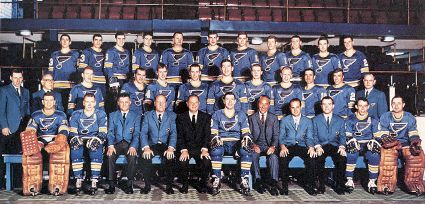
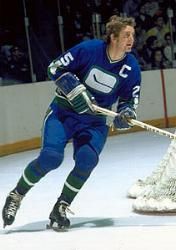
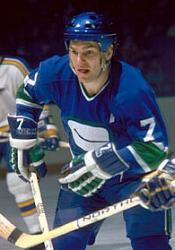
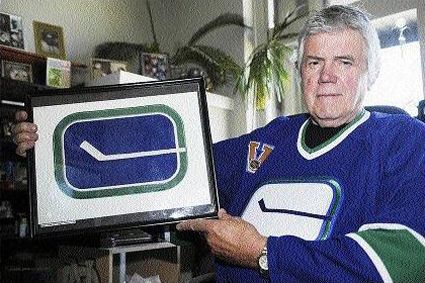
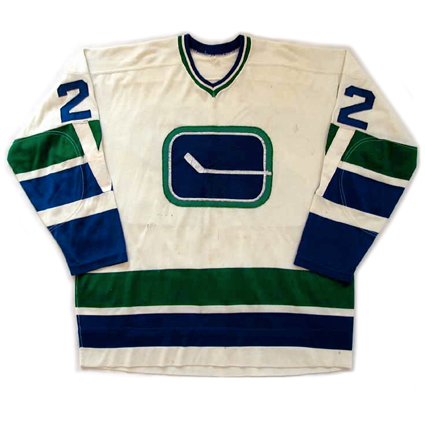
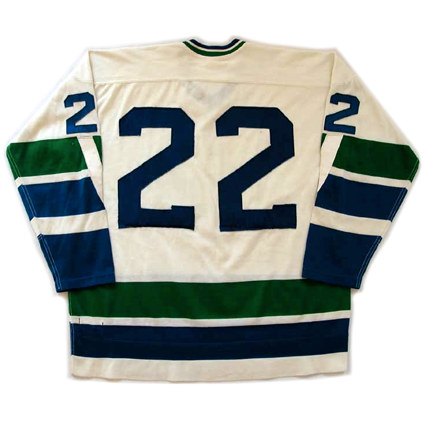
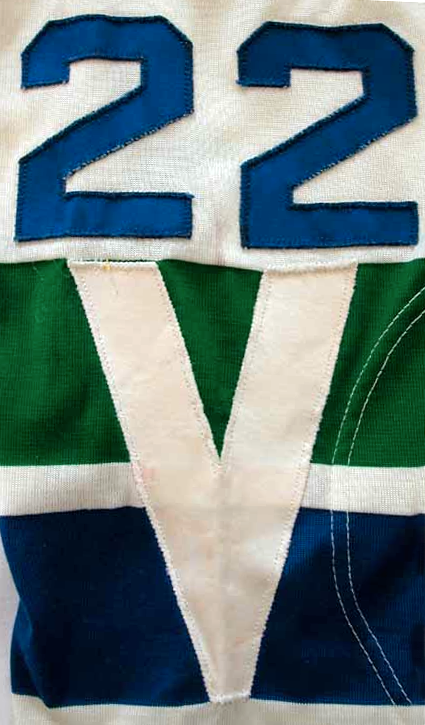
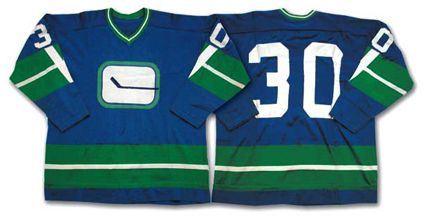
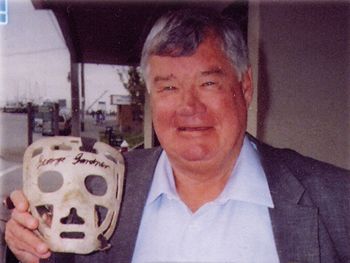
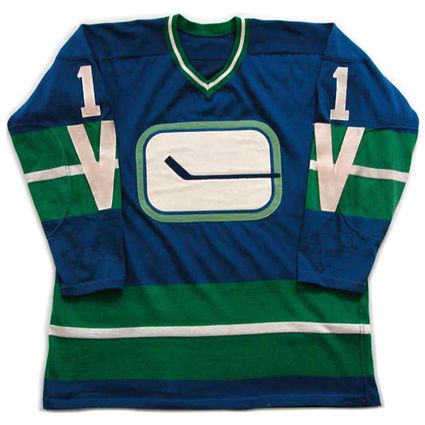
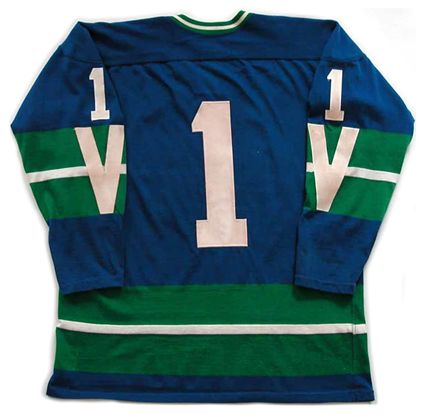

No comments:
Post a Comment
We welcome and encourage genuine comments and corrections from our readers. Please no spam. It will not be approved and never seen.